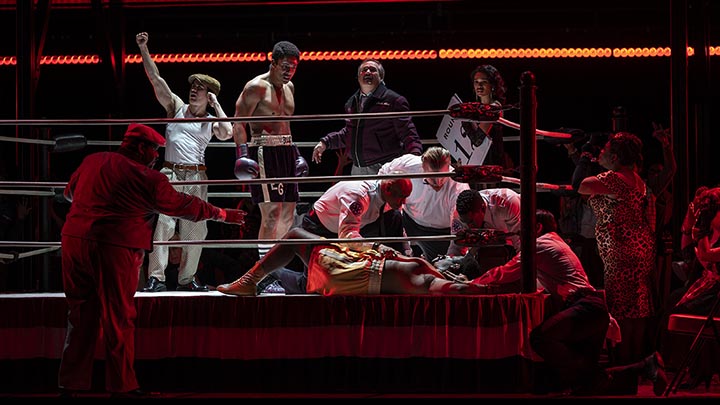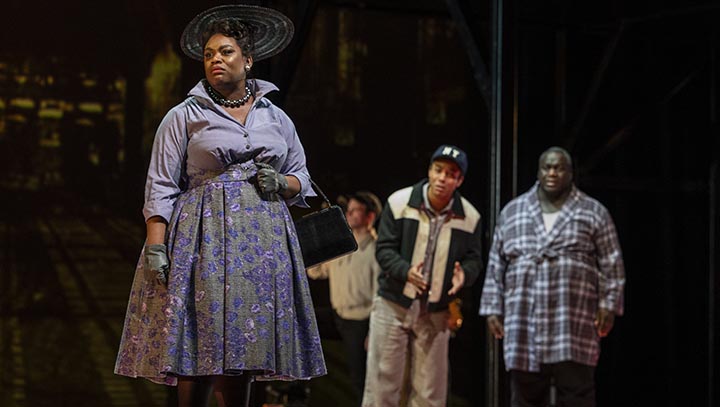I need not have worried. Except for one pivotal bout, boxing is peripheral to this tale of the multi-faceted, tragically destined life of boxing champion Emile Griffith. The piece is much more about love, triumph, defeat, disappointment and forgiveness, all told with vivid music and a wonderful cast of singing actors.
Emile Griffith is portrayed by three actors representing his childhood, glory days, and his sad old age. The piece opens in the bedroom of the aging Griffith and finds him in the grips of pugilistic dementia, unable to dress himself without the aid of his adopted son Luis. Soon, we see the young, ambitious Griffith arriving in New York desiring to become a hat maker and a baseball player on the side. But when Griffith’s mother (who has sent all of her seven children away to other relatives and fails to recognize Emile when they first meet) introduces him to hat manufacturer Howie Albert, Albert sizes up his physique and decides to train him as a boxer and become his manager. Emile is soon showing great promise, winning more and more bouts and championships. The first act ends with the championship fight against Benny “Kid” Paret. Paret taunts Emile’s bisexuality at the weigh-in, calling him “maricon,” and Emile fumes. In the 12th round of the fight, Griffith unleashes a flurry of punches (“seventeen blows in seven seconds”) that knocks out Paret, sending him into a coma, and ten days later, Paret dies. The overwhelming guilt that Griffith feels dominates the final half of the opera.
Griffith’s bisexuality is explored in a couple of scenes at a New York gay bar owned by Kathy Hagen (Meredith Arwady) with a troop of drag queens that attend Griffith’s fights to cheer him on. It is after one of these scenes that the older Griffith leaves the bar and encounters a pack of (presumably homophobic) young men who beat him mercilessly with bats and kicking (the real- life Griffith spent four months in hospital after this). This beating only increases his dementia following a career of blows to the head. At long last, Griffith meets Benny Paret’s son, who grants him forgiveness and reconciliation.
The cast is uniformly excellent. Reginald Smith, Jr. anchors the piece with his moving portrait of the demented older Griffith, his booming baritone and smooth vocal tone a highlight. Griffith is his prime years is embodied by the baritone Justin Austin, in a stylishly sung and physically adept performance. Austin is utterly believable as the man who would become a championship boxer, and vividly plays the character’s shifting emotions. The child Griffith, tormented by his abusive cousin Blanche (Krysty Swann), is played and sung nicely by Naya Rosalie Jones, disguised very well indeed as a boy.
Soprano Whitney Morrison is remarkable as Griffith’s mother Emelda, singing with real power. Her portrayal is quite strong, starting as a confident, rather pushy figure who knows how to get her own way, then showing the dark side of her life in her searing second act aria. Tenor Paul Groves, who also sang Howie at the Met, here shows the two sides of the character’s personality: the supportive manager and the guy who gets as much money as he can out of Griffith and then abandons him. His bitter second act aria excoriating the boxing profession is both angry and moving. I thought the role lay a touch too low for Groves’ voice, but he sang with confidence.
Martin Luther Clark sings beautifully as the sympathetic caretaker Luis, and Meredith Arwady is amusing and fun as Kathy. Special mention must be made for Sankara Harouna, covering for an indisposed Leroy Davis, who was a confident presence and sang the role as if it had always been his own. He was equally fine both as Benny Paret and Paret’s son.
Veteran Chicago actor Larry Yando (the Goodman Theatre’s Scrooge for umpteen years), here plays the non-singing role of the Ring Announcer, bringing some much-needed authority and comic relief to the proceeding.
The cast is supported by a wonderful troop of dancers executing the spectacular choreography of Camille A. Brown. The early scene in the Virgin Islands shows these dancers, decked out in the colorful costumes of Montana Levi Blanco, working with precision and speed. It contributes mightily to the success of the opera. The glorious set by Allen Moyer, constantly shifting from private to public, is enhanced by the projections of Greg Emetaz. Stage director James Robinson keeps the action moving forward with a deft touch, framing the singers with real storytelling skill.
Blanchard’s music, played beautifully by the Lyric Opera Orchestra under Enrique Mazzola, is a combination of jazz style and syncopation. Creating tension through the drums and emotion through the strings, the score supports the staging very well. I admire the playwright Michael Cristofer, but here his libretto occasionally becomes awkward and obvious and does not fully match the poetic musical landscape.
My one problem with Champion is that it literally ends three times. There’s a long and touching ensemble scene about forgiveness that ends with everyone singing “There’s nothing left to say.” It thought that was the end, but there’s two more scenes to follow. It should be said that the final scene in Griffith’s bedroom is deeply moving. And in the curtain call, when Smith, Jr. and Austin meet center stage and embrace, it was the cue for an audience ovation.
Champion moved me, touched me, and also made me think hard about the nature of self-forgiveness. Quite an afternoon.
Photos: Michael Brosilow





